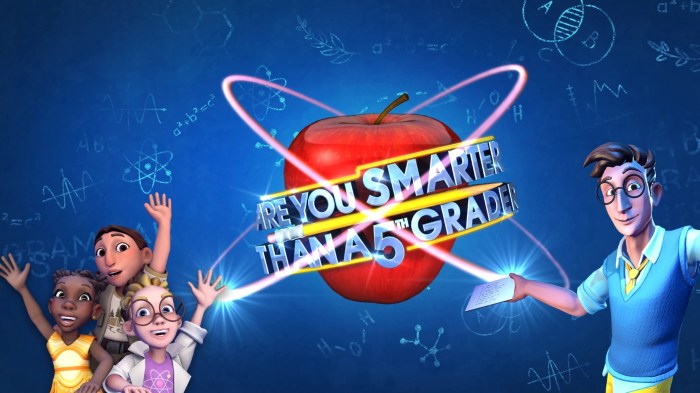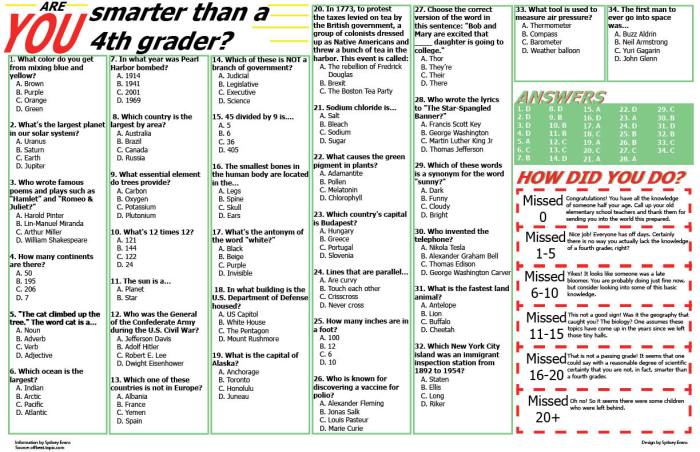Are you smarter than a fourth grader? This intriguing question has captivated audiences worldwide, sparking debates about cognitive abilities and educational standards. Embark on a journey to explore the complexities of this assessment, examining the cognitive skills it measures, the types of questions it poses, and its implications for educational practices.
The test, designed to assess the cognitive abilities of fourth graders, delves into problem-solving, critical thinking, and reading comprehension—essential skills for this developmental stage. By analyzing the difficulty and variety of questions, we gain insights into the challenges faced by fourth graders and the expectations set forth by their curriculum.
Cognitive Abilities Assessed by the Test

The “Are You Smarter Than a Fourth Grader?” test evaluates a range of cognitive abilities that are essential for fourth-grade students. These abilities include:
- Problem-solving:The test assesses students’ ability to analyze information, identify patterns, and develop logical solutions to problems.
- Critical thinking:The test measures students’ ability to evaluate arguments, make inferences, and draw conclusions based on evidence.
- Reading comprehension:The test evaluates students’ ability to understand and interpret written text, including extracting key ideas and making connections between different parts of the text.
These abilities are crucial for fourth graders as they develop their academic and cognitive skills. They provide the foundation for success in higher grades and beyond.
Types of Questions and Their Difficulty
The test includes a variety of question types, each designed to assess a specific cognitive ability. Some of the common question types include:
- Multiple choice:These questions present students with several options and require them to select the correct answer.
- Short answer:These questions ask students to provide a brief written response, such as defining a term or explaining a concept.
li> Essay:These questions require students to write a more extended response, demonstrating their ability to organize their thoughts and present a coherent argument.
The difficulty of the questions varies depending on the specific topic and cognitive ability being assessed. Some questions may be relatively straightforward, while others may require students to apply multiple cognitive skills and demonstrate a deeper understanding of the subject matter.
Test Format and Administration, Are you smarter than a fourth grader
The test is typically administered in a standardized format, ensuring fairness and consistency across all students. It consists of multiple sections, each covering a different subject area, such as math, reading, and science.
The test is timed, and students have a limited amount of time to complete each section. The scoring system varies depending on the specific test version, but typically involves awarding points for correct answers and deducting points for incorrect answers.
To ensure accuracy and fairness, the test should be administered by a trained proctor who follows the established guidelines and procedures.
Comparison to Fourth Grade Curriculum
The “Are You Smarter Than a Fourth Grader?” test aligns closely with the fourth-grade curriculum in many subject areas. The test covers topics that students are expected to master by the end of the fourth grade, including:
- Math:Number operations, measurement, geometry, and data analysis
- Reading:Fluency, comprehension, and vocabulary
- Science:Physical science, life science, and earth science
- Social studies:History, geography, and civics
By comparing students’ performance on the test to the fourth-grade curriculum, educators can identify areas where students may need additional support or enrichment.
Implications for Educational Practices
The results of the “Are You Smarter Than a Fourth Grader?” test can provide valuable insights for educational practices in the fourth grade.
- Identify areas of strength and weakness:The test can help educators identify areas where students are excelling and areas where they may need additional support.
- Tailor instruction:The results can inform differentiated instruction, allowing educators to tailor their teaching methods and materials to meet the individual needs of students.
- Monitor progress:The test can be used as a benchmark to monitor students’ progress over time and track their development of essential cognitive abilities.
By using the test results effectively, educators can enhance their teaching practices and create a more supportive and engaging learning environment for fourth graders.
Popular Questions: Are You Smarter Than A Fourth Grader
What is the purpose of the “Are You Smarter Than a Fourth Grader?” test?
The test aims to assess cognitive abilities such as problem-solving, critical thinking, and reading comprehension, which are crucial for fourth graders’ academic success.
How does the test align with the fourth-grade curriculum?
The test covers various areas of the fourth-grade curriculum, ensuring that students are challenged with questions relevant to their learning objectives.
What implications does the test have for educational practices?
The test results can inform instructional strategies, identify areas where students need additional support, and encourage enrichment opportunities for advanced learners.


